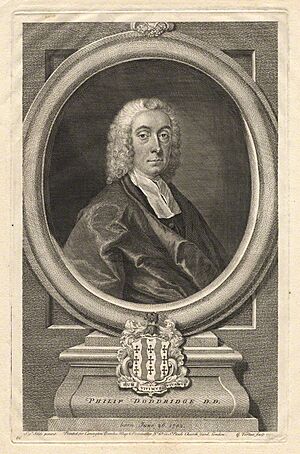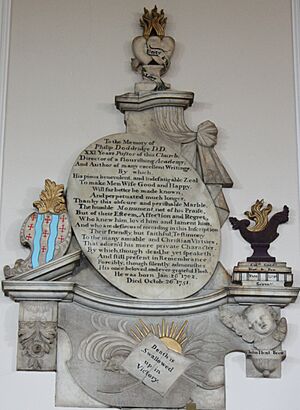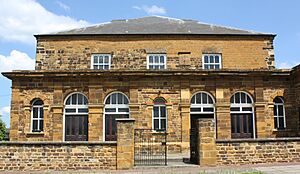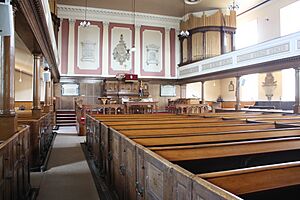Philip Doddridge facts for kids
Philip Doddridge (born June 26, 1702 – died October 26, 1751) was an English minister, teacher, and writer of hymns. He was a Nonconformist, which meant he didn't follow the official Church of England. Instead, he was part of a group called the Congregationalists. Doddridge was known for his strong faith and for helping to shape religious education in his time.
Quick facts for kids
Philip Doddridge
|
|
|---|---|
 |
|
| Born | 26 June 1702 London |
| Died | 26 October 1751 Lisbon |
| Education | Doctor of Divinity |
| Occupation | Writer, university teacher |
Contents
Early Life and Education
Philip Doddridge was born in London on June 26, 1702. He was the youngest of twenty children! His father, Daniel Doddridge, sold oils and pickles. Philip's grandfather, John Doddridge, was also a Nonconformist minister.
Philip's mother, Elizabeth, had a big impact on him. She was the daughter of Rev. John Bauman, a Lutheran clergyman. He had to leave Prague because of religious persecution.
Learning the Bible
Before Philip could even read, his mother taught him stories from the Old and New Testaments. She used blue Dutch chimney-tiles that had pictures on them.
School Days
Philip first had a private tutor at home. Then, he went to a private school in London. In 1712, he attended the grammar school in Kingston-upon-Thames. This was the same school where his grandfather had been the head teacher.
Becoming an Orphan
Philip's mother died when he was eight years old. His father passed away when Philip was thirteen. This left Philip without parents and very little money.
He then moved to a private school in St Albans. There, a Presbyterian minister named Samuel Clarke helped him greatly. Clarke treated Philip like his own son. He guided Philip's education and encouraged him to become a minister. They remained close friends for life.
Marriage and Family
On December 22, 1730, Philip Doddridge married Mercy Maris. She was the daughter of Richard Maris, a baker. They had nine children together.
Sadly, their first child, Elizabeth, died just before her fifth birthday. Four of their children lived to be adults. Letters between Philip and Mercy show us what their family life was like.
Contributions to Education and Religion
Philip Doddridge decided not to become an Anglican minister or a lawyer. Instead, he chose to join a Dissenting academy in Kibworth in 1719. These academies were schools for Nonconformists.
Leading an Academy
Doddridge became a teacher at the academy. In 1723, he took over from his own teacher, John Jennings. Later that year, he was chosen to lead a new academy in Market Harborough. This school moved several times and became known as Northampton Academy. After Doddridge's death, it continued as Daventry Academy.
A Popular Preacher
In 1729, Doddridge was also asked to be the pastor of a church in Northampton. He was a very popular preacher. People said his sermons were practical and helped them feel closer to God.
Busy Life and Writings
Throughout the 1730s and 1740s, Doddridge continued his teaching and church work. He became friends with many religious leaders through visits and letters. He helped create a network of important religious thinkers.
He also wrote many books and over 400 hymns. In 1736, two universities in Aberdeen, Scotland, gave him a special degree called Doctor of Divinity.
His book, The Rise and Progress of Religion in the Soul, was translated into seven languages. It was a very important book for many people. Doddridge also wrote a commentary on the New Testament. Most of his hymns were written to summarize his sermons. They helped people respond to the lessons they learned.
Hymns and Their Legacy
Doddridge often ended his sermons with new hymns he had written. These hymns summarized the main points of his message. However, his hymns were not published until after he died.
The first collection of his hymns had 370 songs. Many of them are still sung today around the world. For example, "O God of Bethel, by whose hand" is in many church hymnals. "Hark the Glad Sound!" is a popular Advent hymn.
Helping Young Students
In 1750, Doddridge started a program called the Youth's Scheme. He was worried that not enough students were attending Dissenting academies. This program helped talented boys from poor families get a good education. It prepared them for further study at an academy.
Doddridge added a preparatory school to Northampton Academy. It started with six students. Older students from the Academy helped teach them. Doddridge hoped to hire another teacher, but he died before he could. The Youth's Scheme ended after his death.
Death and Lasting Impact
Philip Doddridge's health was never very strong. In 1751, it got worse. He sailed to Lisbon, Portugal, hoping the change would help him. Sadly, he died there on October 26, 1751, from tuberculosis. He was buried in the British Cemetery in Lisbon.
Doddridge wanted different Nonconformist groups to work together. His most famous book, The Rise and Progress of Religion in the Soul, was reprinted many times. It influenced many people, including William Wilberforce, who fought to end slavery.
His other well-known works include The Family Expositor, a commentary on the Bible, and Life of Colonel Gardiner. John Wesley, another famous religious leader, said he learned from Doddridge's Family Expositor.
Doddridge's academy eventually became New College London. This college trained ministers for the Congregational and United Reformed Churches. His large collection of writings is now kept at Dr Williams's Library.
Doddridge United Reformed Church
The Doddridge United Reformed Church in Northampton is named after him. Philip Doddridge was a minister there from 1729 to 1751. The church was first built in 1695. It has galleries and old-fashioned box pews inside. There is also a memorial to Doddridge there.
Works by Philip Doddridge
- The Rise and Progress of Religion in the Soul (1745)
- The Family Expositor (6 volumes, 1739–1756)
- Life of Colonel Gardiner (1747)
- Course of Lectures on Pneumatology, Ethics and Divinity (1763)
- Practical Discourses on Regeneration
- Ten sermons on the power, & grace of Christ, and on the evidences of His glorious gospel
- A Dissertation on the Inspiration of the New Testament
Some of His Hymns
- Awake, my soul, stretch every nerve
- Hark the glad sound! the Saviour comes
- O God of Bethel, by whose hand
See also
- Congregational church
- English Dissenter
- Independent (religion)
Images for kids
 | Delilah Pierce |
 | Gordon Parks |
 | Augusta Savage |
 | Charles Ethan Porter |





